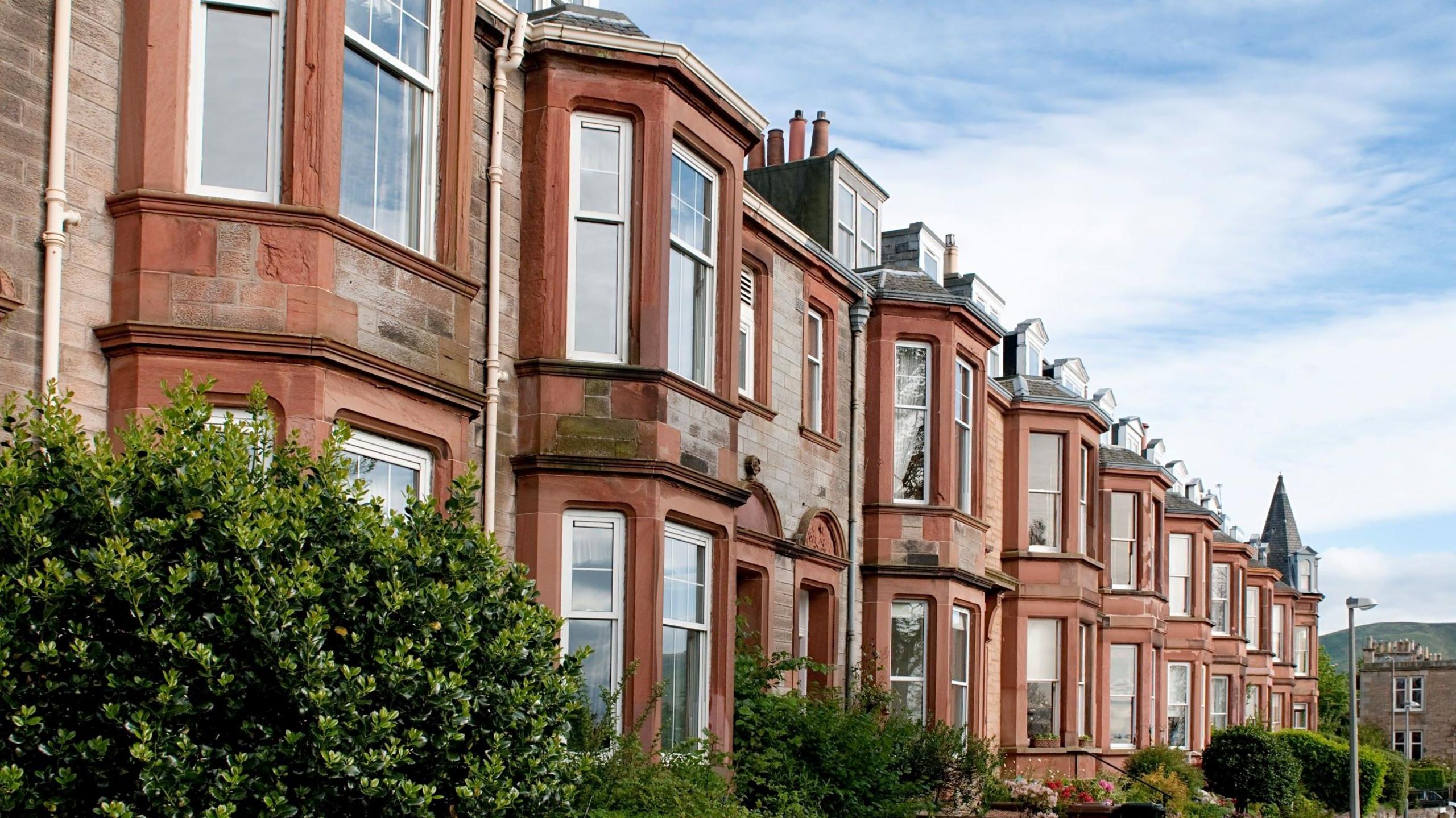Housing bill could create new rent control areas

- Published
The Scottish government has published plans to introduce longer-term rent controls for the private sector.
The Housing (Scotland) Bill will place a duty on local councils to carry out assessments on the state of private accommodation in their area.
The bill - which comes against the backdrop of four local authorities declaring a housing emergency - has been welcomed by tenants' rights groups.
But the Scottish Association of Landlords (SAL) told BBC Scotland the legislation would exacerbate Scotland’s housing crisis.
Housing emergency: What can be done?
- Published2 November 2023
I help people find housing - but still ended up homeless
- Published27 February 2024
The bill does not specify particular controls which could be placed on landlords, though it does say that rises would be capped during and in-between tenancies.
If passed, it will also introduce new rights for tenants to keep pets and decorate their homes.
Tenants' Rights Minister Patrick Harvie said a "fairer, well-regulated rented sector" would be good for both tenants and landlords.
"Tenants benefit from improved conditions and security, while good responsible landlords will thrive when their good practice is recognised by regulation," he said.
"Scotland has led the way across the UK in improving the experience of people who rent their homes and this reform has been at the same time as significant growth in the size of the private rented sector.
"Progressive reform can lead to better conditions and a healthy rented sector overall. I want to keep working with both tenants and landlords to achieve that goal."
Housing emergency
Controls could include keeping any rises to a specified percentage.
Student accommodation will be exempt from rent control areas.
The bill comes at a time of increased concern about the state of housing across Scotland.
The Scottish government cut £196m from its affordable housing budget earlier this year and quarterly figures released on Tuesday showed the lowest number of housing association starts since 1988.
Four councils - Argyll and Bute, Edinburgh, Fife and Glasgow have declared a "housing emergency".
And recent figures from the Office for National Statistics (ONS) revealed that Scotland has seen the highest rent increases of any UK nation.
That is despite ministers introducing temporary legislation in 2022 which capped rents in a bid to address the cost of living crisis.
The data showed that average private rents increased in by 10.9% in Scotland, 8.8% in England and 9% in Wales.
Aditi Jehangir, secretary of the Living Rent group, praised the new legislation as having the potential to have a "huge impact" on tenants.
She said: “This bill is a huge step forward for tenants.
“It includes key measures that we have been fighting for such as rent controls that apply between tenancy, the ability to cap increases at 0%, rights for joint tenants to leave and the right to have pets and redecorate."

John Blackwood stated he had concerns over the proposals
John Blackwood, chief executive of SAL, criticised the plans. He said they "do nothing" to help private tenants or landlords.
"The rent control proposals, as has been seen in places like Ireland which has similar measures, will see reduced investment and more landlords leaving the sector, leading to higher costs for tenants," he said.
Tackling homelessness
As well as changes to the private rental sector, the bill proposes duties on public authorities - including councils, the police and the health service - to ensure people do not become homeless.
They will be required to ask about the housing circumstances of those they interact with and provide support, or refer them, to their local authority.
Councils will be required to act six months before homelessness is imminent, instead of the current two months.
And the bill will update the definition of domestic abuse in current housing legislation and force social landlords to devise a policy to support tenants at risk of homelessness because of abuse.
Housing Minister Paul McLennan said: "Early action, through the kinds of measures included in the housing bill, results in fewer people reaching the point of housing crisis."
'Half-baked'
However, housing charity Shelter Scotland said the proposals failed to address "systemic issues driving the housing emergency”.
Director Alison Watson said it was not realistic to expect councils to fulfil new obligations when they are already failing to meet existing duties.
“What we need is urgent action to drive up the supply of social homes, invest in local services and stop councils breaking existing homelessness laws.
"Instead, we have a housing bill that does none of that and risks diverting frontline staff from the task in hand."
Scottish Labour described the proposals as "half-baked".
Housing spokesman Mark Griffin said: "This bill exposes the fact that the SNP government has no clear plan to tackle the housing crisis and homelessness in Scotland after 17 years of failure and decline.
"It is nothing short of a shocking failure of the most vulnerable in our society.
"The bill does not offer enough to tackle homelessness, is slow to help renters, and has done nothing to properly encourage affordable home building."